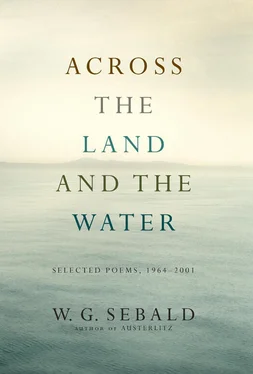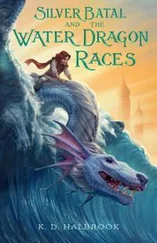In translating this volume, I have enjoyed the advice, experience, and expertise of several people I should like to thank here. First and foremost among these is Sven Meyer, the editor of the German volume Über das Land und das Wasser , published by Hanser Verlag in Munich, whose groundbreaking work paved my own path to the Marbach archives. I have discussed aspects of W. G. Sebald’s poetry and writing life with a number of the author’s friends and colleagues, including Philippa Comber; Thomas Honickel; the late Michael Hamburger; Anne Beresford; Albrecht Rasche, the author’s friend during his Freiburg student days; Reinbert Tabbert, the young poet’s colleague at the University of Manchester in 1966 and 1967; and Jo Catling, his later colleague at the University of East Anglia. I am indebted to all of them for their helpful, and often extensive, responses to my queries. I am grateful to Volkmar Vogt of the Archiv Soziale Bewegung for supplying me with copies of Sebald’s early publications in the journal Freiburger Studenten-Zeitung; to the Estate of W. G. Sebald and the staff of the German Literature Archive in Marbach for giving their support to this project; and to the Institute for Advanced Studies in the Humanities in Edinburgh, where some of the initial work for this volume was undertaken. Last but not least, I owe a special debt to Karen Leeder, who kindly provided critical comments, invaluable to me, on early drafts of the translations that follow.
Iain Galbraith
In the translations that follow, punctuation and orthography (e.g., in proper nouns) are generally consistent with the author’s typescripts, as held in the W. G. Sebald Archive at the Deutsches Literaturarchiv, Marbach, or, in the case of material already published in German, with the texts of poems in journals and books, as sourced in the notes that conclude this volume. Accordingly, occasional irregularities or punctuational inconsistencies in the source texts have been retained in the present edition. Words and phrases that appear in English in the German poems are identified in the endnotes.
For how hard it is
to understand the landscape
as you pass in a train
from here to there
and mutely it
watches you vanish.
A colony of allotments
uphill into the fall.
Dead leaves swept
into heaps.
Soon — on Saturday—
a man will
set them alight.
Smoke will stir
no more, no more
the trees, now
evening closes
on the colors of the village.
An end is come
to the workings of shadow.
The response of the landscape
expects no answer.
“The intention is sealed”
The intention is sealed
of preserved signs.
Come through rain
the address has smudged.
Suppose the “return”
at the end of the letter!
Sometimes, held to the light,
it reads: “of the soul.”
Hedges have grown
over palace and court.
A forgotten era
of fountains and chandeliers
behind façades,
serenades and strings,
the colors of the mauves .
The guides mutter
through sandalwood halls
of the Wishing Table
in the libraries
of princes past.
On duty
on a stretch in the Alpine foothills
the railway clerk considers the essence
of the tear-off calendar.
With bowed back
Rosary Hour
waits outside
for admittance to the house
The clerk knows:
he must take home
this interval
without delay
The signs are gathered
settled at dusk’s edge
carved in wood
bled and blackened
printed on the mountain
Hawthorn in the hedgerow
along a length of path
black against winter’s papyrus
the Rosetta stone
In the house of shadows
where the legend rises
the deciphering begins
Things are different
from the way they seem
Confusion
among fellow travelers
was ever the norm
Hang up your hat
in the halfway house
Remembered Triptych of a Journey from Brussels
White over the vineyard by Sankt Georgen
white falls the snow across the courtyard and on
the label of an orange-crate from Palestine.
White over black is the blossom of the trees
near Meran in Ezra’s hanging garden.
Autumn in mind April waits
in the memory painted on walnut
like the life of Francis of Assisi.
At the end of September on the
battlefield at Waterloo fallow grass grows
over the blood of the lost Marie-Louises
of Empereur Bonaparte
you can get there by bus
at the Petite-Espinette stop
change for Huizingen
a stately home, sheltered by ivy, transformed
into the Belgian Royal Ornithological
Research and Observation Unit
of the University of Brussels.
On the steps I met Monsieur Serge Creuve,
painter, and his wife Dunja—
he does portraits in red chalk on rough paper
of rich people’s children
from Genesius-Rhode. — Lures them into the house
with the unique WC, well-known
to neighbors. — One does like to visit an artist.
“Shall we buy the ferme in Genappe?”
In the evening at Rhode-St. Genèse
a timid vegetable man carries his wares
up garden paths past savage dogs
to the gate, for instance, of the Marquise of O.’s villa.
A woman’s mouth is always killed
by roses.
As a lodger on the third floor—
the red sisal only goes up to the second—
of Mme. Müller’s Cafeteria
five minutes’ walk from the Bois de la Cambre
I’m the successor to Robert Stehmer
student from Marshall Missouri.
Gold-rimmed jug-and-bowl on the dresser
a hunting scene over the Vertiko cabinet
door to an east-facing balcony. — At night
noises on the road to Charleroi.
Chestnuts fell from their husks
in the rain.
I saw them in the morning
glossy on the sand of the patio.
I saw them in the morning—
taking tea and Cook Swiss
to be eaten with a knife and fork.
I saw them in the morning
waiting behind the curtain
for a trip to town
in quest of Brueghel
at the Musée Royal.
Départ quai huit minuit seize
le train pour Milan via St. Gotthard
I recognized Luxemburg by the leaves on its trees
then came industrie chimique near Thionville,
light above the heavenly vaults
Bahnhof von Metz, Strasbourg Cathedral
bien éclairée. — Between thresholds
lines from Gregorius, the guote sündaere,
from Au near Freiburg, rechtsrheinisch,
not visible from Colmar — Haut Rhin.
Early morning in Basel, printed on
hand-made Rhine-washed lumpy paper
under the supervision of Erasmus of Rotterdam
by Froben & Company, fifteen hundred and six.
Men on military service bound for Balsthal in the Jura
shaved and cropped, several smoking,
outside all changed.
Route of all images
light gray river-sand
ruddy hair minding
swollen shadows
lances and willows
White leaf, you
Green leaf, me
Rafael, Yoknapatawpha,
Light in August
between leaves
anxious mellowing
before birth
as a shadow
over the sunny road
Go to the Aegean
to Santorini
Land of basalt
phosphorescence on the rudder
Hold the water
in your hand:
it glows — at night—
aubergines in front of the house
shadowy in the dark
against the whitewashed wall
bright green in daytime purple
raffia-threaded
in the sun.
Читать дальше












